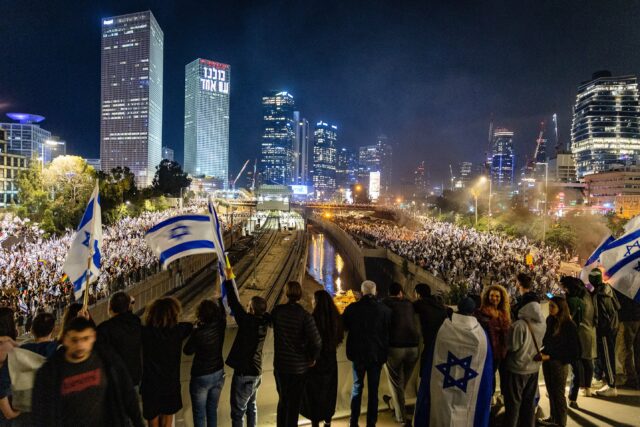Israeli and international news media have treated declarations by Israel Defense Forces reservists that they would not report for duty if Prime Minister Benjamin Netanyahu’s government continues its judicial reform efforts as “a refusal to serve festival.” But the bigger, unreported story is the larger number of IDF personnel pledging they will serve and condemning politization of the military.
So David M. Weinberg told a Jewish Policy Center webinar on “The IDF, Judicial Reform and the Media” on August 3. A founding senior fellow at Misgav, the Institute for National Security and Zionist Strategy, a new think tank in Jerusalem, Weinberg charged Israeli Channel 12 TV news and other outlets as “cheerleaders.” He said they have been celebrating every announcement by protesting reservists and retired officers.
But, according to Weinberg, also a columnist for The Jerusalem Post, “well over 100,000 active and reserve personnel are on record rejecting calls to refuse to serve” and “you wouldn’t know this from Israeli or global media.” Those not following Israeli Jewish religious, politically right-wing or nationalist-leaning news media wouldn’t know that last week a large number of retired senior IDF and other security officers released “a statement calling on all to answer reserve calls,” Weinberg said.
Actual refusal to report would not only be criminal under Israeli law, but also amount to a “silent military coup” against the country’s democratically elected government, he stressed. Given that Israel’s relatively small standing army relies on its larger, regularly trained reserve contingents, refusal to serve “is the true threat to democracy,” Weinberg said, not reform efforts to diminish the role of supreme court justices in filling court vacancies and limit the body’s self-established discretion to overturn political decisions.
The number of young Israelis who’ve refused draft notices has been “miniscule,” he stated. “My concern … whether it’s five, 500 or 500,000 reservists refusing—and we don’t know the real number, our enemies may think … because of this ‘refusal to serve festival’—Israel won’t be ready” to deter or fight them, Weinberg said.
He expects battle with the Iran-backed, Lebanon-based Hezbollah (Party of God) in as little as two or three months. Weinberg said He noted that Hezbollah has conducted increasingly provocative actions, including laying mines along the Israeli-Lebanese border and establishing a “Boy Scout”-like encampment just over the border on Israeli territory.
Hezbollah’s arsenal of rockets and missiles, some of them precision weapons, has been estimated at between 120,000 and 220,000,Weinberg said. This compares with the 10,000 or so it possessed prior to the 2006 Israeli-Hezbollah war. “So, the readiness of the army may be tested soon on the northern border.”
Ready for combat?
Weinberg said the standing army “is ready to go” and that he believes reserve brigades will show up for battle. Whether they are trained to combat level “is another question,” he added. Recent internal IDF reports have suggested readiness for ground-to-ground combat against a trained, experienced enemy like Hezbollah has a way to go.
In the case of war with Hezbollah, reservists will be needed to patrol the West Bank and perhaps assist Israeli police and border police in dealing with violence in Israel’s own Arab sector, Weinberg forecast.
Reported Israeli-Saudi Arabian rapprochement needs to be given time, he said. Some, including opponents of the Netanyahu government, of Saudi Crown Prince Mohammed bin Salman, and those ideologically still committed to a Palestinians-first viewpoint, “are actively trying to undermine” a possible agreement between Jerusalem and Riyadh. And the Saudi crown prince is unlikely to “reward” the Biden administration with such a diplomatic triumph, given President Biden’s vehement criticism of his rule in the 2020 campaign and after.
But an Israeli-Saudi Arabia deal “would gut 100 years of Arab psychological warfare against the Jews’ return to Israel” Weinberg said. “And it would deal a deathblow to ‘woke’ hostility, especially if backed by a Democratic administration” in America.
According to Weinberg, the shift of Israel to the U.S. Central Command’s (Centcom) area of responsibility from Europe Command (EUCOM) was “a strategic earthquake” of positive forces. It has enabled “much closer training, intelligence sharing and cooperation with other U.S. allies.”
If American military leaders harbor concerns about reported “refusal-to-serve” developments in the Jewish state, the results of the next two drafts, when Israel selects “the best, brightest and brawniest” for the IDF should answer them,” he said. So far, there’s been no decrease in the percentage of most desirable draftees, Weinberg said.
Finally requiring haredi (ultra-Orthodox) men and women to serve in the IDF “is one of the most complicated and divisive issues facing Israeli society,” he acknowledged. Weinberg said thinks they do have an obligation to perform national service, whether in the military, social service or other commitment. But “that community is nowhere close to agreeing to that.”


